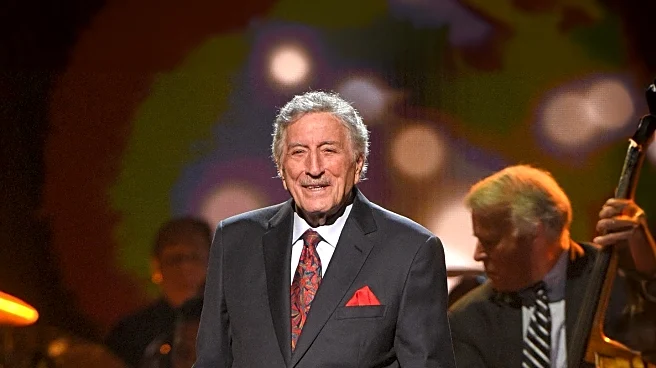What's Happening?
Tony Christie, the renowned singer, is utilizing music as a therapeutic tool in his battle against dementia. Diagnosed in 2023, Christie has been actively raising awareness about the condition and the benefits of music in memory recall. His granddaughter, Deia Fitzgerald, frequently visits him and engages in music sessions using a smart speaker, which helps Christie reminisce and sing along to his favorite tunes. Despite his diagnosis, Christie continues to perform and record music, maintaining a strong voice at the age of 82. He has also become an ambassador for Music for Dementia, contributing to a dementia-friendly playlist for the charity's online radio service.
Why It's Important?
The use of music as a therapeutic tool for dementia patients highlights the potential for non-pharmacological interventions in managing cognitive decline. Christie's experience underscores the importance of music in stimulating memory and emotional connections, offering a glimpse into alternative methods for improving the quality of life for those affected by dementia. His continued performances demonstrate resilience and the ability to maintain professional activities despite health challenges, serving as an inspiration to others facing similar conditions. The involvement of family members, like Fitzgerald, in supporting dementia patients also emphasizes the role of personal relationships in caregiving.
What's Next?
Christie's ongoing advocacy for dementia awareness and his role as an ambassador for Music for Dementia suggest further initiatives to promote music therapy as a viable option for dementia care. As he continues to perform, there may be opportunities for collaborations with other artists or organizations to expand the reach of music therapy programs. Additionally, his public engagement could lead to increased funding and research into the benefits of music for cognitive health, potentially influencing public policy and healthcare practices.
Beyond the Headlines
Christie's story sheds light on the cultural and emotional dimensions of music, illustrating its power to transcend generational gaps and foster connections between family members. The narrative also touches on the ethical considerations of how society supports aging artists and individuals with health challenges, prompting discussions on the balance between personal privacy and public advocacy. Furthermore, the story may inspire broader conversations about the integration of arts and healthcare, encouraging innovative approaches to treatment and support for dementia patients.









